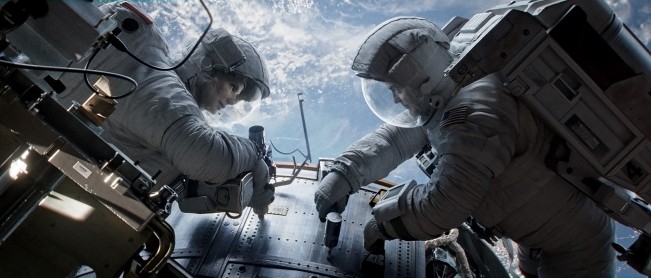By Jake Howell jake.howell@utoronto.ca
The Torontonian Reviews GRAVITY
 From open to close, Alfonso Cuarón’s sci-fi survival drama is a technical and visual achievement. Indeed, in the 3D cinema game, Gravity is currently king. But what starts as a casual space stroll between Dr. Ryan Stone (Sandra Bullock) and Matt Kowalsky (George Clooney) soon becomes a series of unfortunate events, and the result is weightless entertainment. The 3D IMAX magic of it all reveals itself to be little more than eye candy, and it’s disappointing that a film this ambitious stimulates only certain parts of your brain.
From open to close, Alfonso Cuarón’s sci-fi survival drama is a technical and visual achievement. Indeed, in the 3D cinema game, Gravity is currently king. But what starts as a casual space stroll between Dr. Ryan Stone (Sandra Bullock) and Matt Kowalsky (George Clooney) soon becomes a series of unfortunate events, and the result is weightless entertainment. The 3D IMAX magic of it all reveals itself to be little more than eye candy, and it’s disappointing that a film this ambitious stimulates only certain parts of your brain.
If you are okay with ignoring the silliness of it all, Gravity is really, really cool. And while the film’s spectacle is indisputable, I nevertheless feel compelled to argue how goofy some aspects of this movie truly are. Throughout the experience—and it is one, to be sure—I was never challenged philosophically by the premise, never moved by the events, and most importantly, never swayed emotionally by the characters in any meaningful way.
This criticism is derived from an inexcusable handling of character development. Gravity is full with clunky dialogue exchanges that break the immersion, because we know they are artifacts of the screenwriting process. We have to have some background information, right? Certainly, but at the same time, we don’t want our hands held. Consider an early moment where Kowalsky attempts to calm down a rattled Dr. Stone: “Where is home?” he asks, pointing at our planet below. “Where are you from?” If you can buy that this question had yet to come up (maybe back home, in a NASA bar somewhere?), great. But this is not the only example of how blatantly Cuarón and his co-writer son Jonas attempt to provide us with narrative bread crumbs.
Around the middle act, another fragment of Dr. Stone’s background is revealed: the poorly fleshed-out mention of her late daughter, an “angel” who Stone finds the strength to continue from. This comes out of nowhere and is wholly underwritten, coming across as Hollywood cliché. It’s a shame that what holds this film down is something that could have been changed far before they went to set.
It’s also bizarre that the writing is so overtly visible, because most everything else is seamless. Through some special effects trickery, Cuarón manages to sneak the camera in and out of space helmets without cutting, and you’re left scratching your head in disbelief. “How did they do that?” you’ll ask, trying your best to ignore how conspicuous the dialogue is.
When it comes to survival films, the current entry to beat is J.C. Chandor’s All is Lost (coming later this fall), due to Robert Redford’s profoundly excellent solo performance and the movie’s conceivable premise. Gravity, on the other hand, is more concerned with visual splendor than it is telling a believable tale. But allow me to give credit where credit is due: Bullock’s performance is very strong (Clooney’s, somehow, is a throwaway) and the actor lives up to her 2010 Academy Award.
The issue here is depth and a screenplay that has bigger problems than typical coincidences and photo-finish escapes (which are more or less forgivable for this type of movie). In terms of these obstacles, the film does a fine job selling you the same sense of emergency over and over, and just about every way you could die in space is hinted at. It’s definitely very entertaining. Maybe a little repetitive, too, but at least Cuarón asks for only ninety minutes of your time.
Finally, there has been some rhetoric online that Gravity is unlike anything you’ve ever seen before. I don’t exactly agree, but I can see why the sentiment is being tossed around. Fans of Cuarón’s earlier work and accomplished direction (the tracking sequences in Children of Men continue to stand out) will find much to appreciate here, and the film’s 13-minute opening shot is worth the price of admission alone. At the end of the day, however, the film is comparable to James Cameron’s Avatar: both films deliver astonishing 3D visuals on a debatable script, and it’s up to you to look past it.
















This is first review I read that really laid into the dialogue…is it really that bad? Wow! Noticed it seemed a bit stiff in trailers but this makes it sound just flat awful.